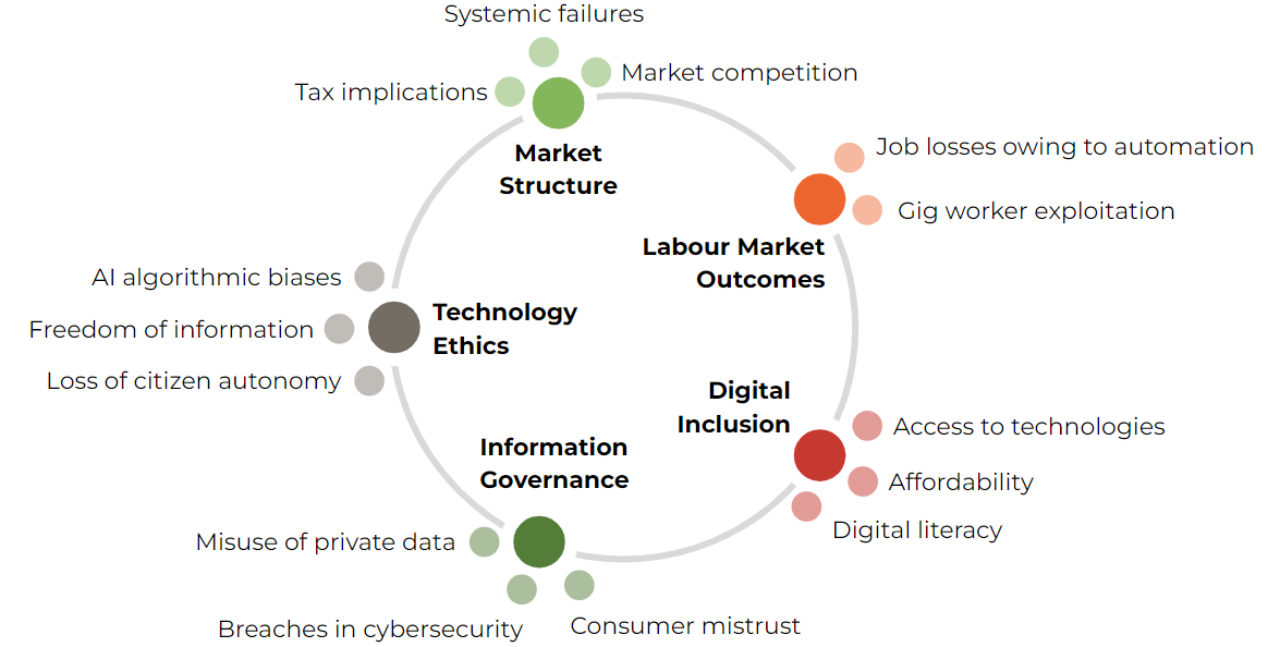
Political economy of technology governance in Ghana
The evolution of Ghana’s digital economy presents exciting economic and social opportunities, but also significant risks.
As part of a broad political analysis of emerging and critical technologies across African and South Asian emerging markets, our Centre of Digital Excellence was commissioned by the Foreign, Commonwealth and Development Office (FCDO) to conduct this analysis for Ghana. The goal was to assess the likely trajectory of Ghana’s technology development and its impact on key technology governance issues. This will contribute toward the FCDO’s activities shaping emerging governance of these technologies through investment, trade, aid, regulation, security and regulatory diplomacy.
Genesis developed a technology governance framework (see image below), which was informed through an in-depth assessment leveraging a combination of desktop research and stakeholder engagement with local and regional experts, to answer three key questions:
- What is the framework of technology governance in the context of open economies, open societies and human rights?
- How is the framework applicable to Ghana?
- How can FCDO support emerging technology governance?

This framework synthesises the many global and African emerging technology governance issues in a systematic way to better understand the landscape, and in particular how it relates to Ghana. The framework is rooted in open economies and open societies, and has five main components that encapsulate some of the most pertinent issues arising as a consequence of technological innovation. The themes: market structure; labour market outcomes, digital inclusion, information governance and technology ethics.
To localise this framework to Ghana, and prioritise key technology governance issues, we considered Ghana’s technology development, national development priorities and where substantial financial investment exists. Through this process, three key areas emerged as priority:
- Digital inclusion: This concerns firstly adequate access to internet, broadband and electricity; secondly affordable data and feature or smartphone devices; and thirdly sufficient digital literacy in the form of content development and vocational education development. These critical components allow individuals to engage in the digital economy and harness opportunities. In the context of Ghana, the economy needs to prioritise progression in these three areas to improve digital inclusion of its citizens, particularly those who live in more rural or remote areas in the northern parts of the country.
- Market structure: This relates firstly to tax implications imposed on tech companies that do not have a physical presence in Ghana but provide digital services to Ghanaian citizens, and ICT firms operating in the country. Secondly, this component considers how a lack of market competition in the digital economy can eradicate avenues for market entry for new firms if left ungoverned. In Ghana, the tax imposed on the ICT sector, together with a lack of competition policy to regulate mobile network operators, leaves consumers vulnerable to anti-competitive pricing of ICT services alike.
- Information governance: This concerns governance around appropriate data management, continuous revisions to cybersecurity laws and regulations, and pertinent consumer protection regulation. If these regulations are not continuously updated, Ghanaian citizens could be left exposed to severe consequences of breaches in, or misuses of personal data, risking considerable human-rights infringement and a move away from a democratic, accountable economy.
The final report developed by Genesis consolidated insights on these research questions to inform the FCDO’s internal Technology and Innovation Unit on emerging technology priorities, local institutional engagement, drives of investment, and governance. The report contributed toward the FCDO’s strategies for international engagement by providing recommendations for strategic interventions and collaboration.